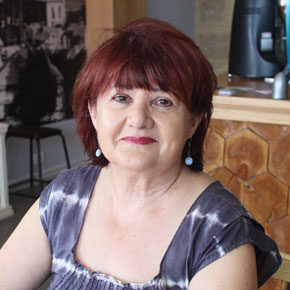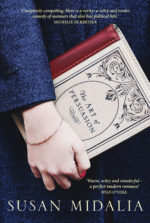Fremantle Press author Susan Midalia’s advice on the art of writing for emerging writers

Ever wondered what it’s like to be a writer? Ever pondered how successful authors got published? Susan Midalia, author of The Art of Persuasion, talks about how she started out, the difficulties of getting published and how the industry has changed.
How difficult did you find it when you were first starting out as a writer?
I began writing fiction in 2007, and have since published four books – three short story collections and a novel. I didn’t find it difficult to produce four books in eleven years, because I had, and continue to have, the privilege of writing full-time.
The most important element for a writer is time: extended, reflective time in which to draft, re-draft and re-draft.
Another important aspect of writing is having a sense of self-belief. Mine came after winning a couple of short story competitions, which isn’t to sound boastful, but to make the point that a writer must have some confidence that what they’re producing is worth reading. It’s important to find a balance between self-belief that isn’t delusional and being self-critical without feeling paralysed.
Another crucial point for emerging writers is to check journals and publishers’ lists to find out what kinds of work they are interested in publishing.
 Do you feel that things have changed for writers in WA since then?
Do you feel that things have changed for writers in WA since then?
I write literary fiction, so I should preface my comments with the qualification that things might be different for writers of genre and popular fiction more generally. From my perspective, I don’t think things have changed much, if at all.
It’s difficult for most WA writers who aren’t bestsellers to be reviewed outside WA, or to be invited to writers festivals outside the state. The literary culture in Australia is very much centred on Sydney and Melbourne. I say this without bitterness or resentment – well, maybe a smidgen.
To give you one recent example: I was recently invited to do an interview on a national program based in the eastern states – to my great excitement – only to have the invitation withdrawn because the producers had found someone in Sydney instead.
Many of my WA writer friends have similar stories of half chances that came to nothing, or outright rejections. I know that Fremantle Press works hard to promote its writers in the eastern states, but it must feel like the proverbial uphill battle.
What made you want to be a writer?
I wanted to experience the pleasure of using language to make something out of nothing. I have always been an assiduous reader, but never felt the desire to write until I began an academic PhD. I found myself increasingly drawn to using words with precision and nuance, and to creating rhythmically satisfying sentences. So much so that I became more interested in the writing process than in the ideas I was meant to be advancing. I did finish that PhD, but also found I was hooked by the provocative, glorious, messy business of mucking about with words.
How did you feel when you found out your first book was going to be published?
Elated. It ranked only slightly lower than getting married and having two children. I remember phoning my husband and best friend (who by that stage was living in Sydney) and blubbering with excitement. I was probably incomprehensible.
 What is the difference between writing short stories and novels?
What is the difference between writing short stories and novels?
It’s still widely believed that writing short stories is an apprenticeship before proceeding to write the ‘real’ thing: a novel. But it’s not a hierarchy; the two genres are simply different, and require different ways of thinking.
The main difference between them stems from different understandings of our life-in-time. Short stories assume that we experience and try to understand our lives in terms of moments in time: moments which can be profound, enduring, climactic, anti-climactic, crises, turning points. By contrast, novels assume that we experience and try to understand our lives as a sequence of events that unfold over time.
As such, stories work by focusing on a few moments in time, and through compression: they use relatively few words to generate subtle meanings. Novels work through the development and amplification of events, characters and ideas.
Both genres have their challenges.
What one vital piece of advice would you give to someone who wants to be a writer?
Read ‘good’ writing, widely and often, to learn about the many wondrous possibilities of language and story. There is no better training for a writer. If I’m permitted another piece of advice: just write! As often as you can, and see where it takes you. Even if it’s only one sentence a day that you’re proud of.
Why, in your opinion, is WA a good place to be a writer?
I’ve heard it said that WA produces good writers because we’re geographically isolated from the rest of the country, and indeed from the rest of the world, but I don’t agree. There’s no empirical evidence for this belief, for a start. Nor can I see any logical connection between creativity and isolation; that’s a romantic stereotype of the writer as necessarily reclusive.
A writer can produce memorable work anywhere.
 Forging and sustaining a writing career is a different matter; as my earlier comments show, WA writers of literary fiction tend to be neglected in the national literary culture. On the positive side, however, I have found the WA writing community to be wonderfully supportive. Maybe that’s a consequence of feeling unsupported elsewhere; or maybe we WA writers are just damn nice people.
Forging and sustaining a writing career is a different matter; as my earlier comments show, WA writers of literary fiction tend to be neglected in the national literary culture. On the positive side, however, I have found the WA writing community to be wonderfully supportive. Maybe that’s a consequence of feeling unsupported elsewhere; or maybe we WA writers are just damn nice people.



